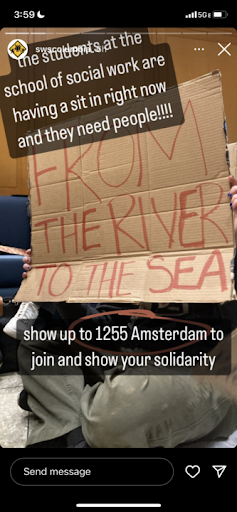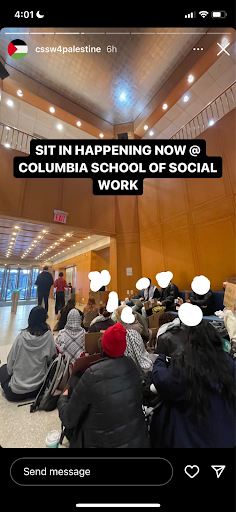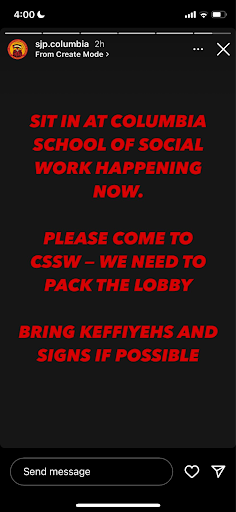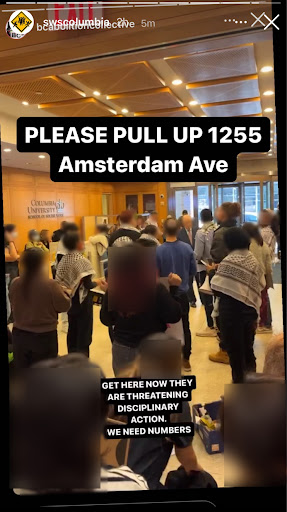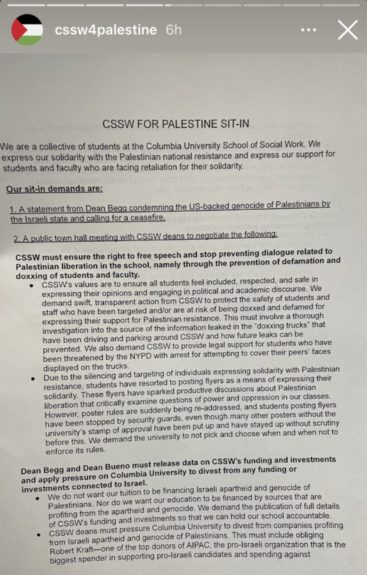The Columbia Social Workers for Palestine, a new student collective at the School of Social Work, organized a sit-in on November 8 in support of Palestine.
On Wednesday, November 8, the Columbia Social Workers for Palestine held a sit-in in the School of Social Work (CSSW) building. Participants filled the lobby, wearing keffiyehs and bearing signs reading “From the River to the Sea,” “Social Workers 4 Palestine,” “We Demand Liberation,” “Social Workers Condemn Genocide,” and “Stop the McCarthyism of Universities.”
Student organizations such as Columbia Students for Justice in Palestine (SJP) and Student-Worker Solidarity (SWS) expressed support for this sit-in via Instagram story, though they are not directly affiliated. On its own Instagram story SWS implored viewers, “Get here now they are threatening disciplinary action. We need numbers.”
Members of the sit-in declared themselves as holding “solidarity with the Palestinian national resistance” and said they supported “students and faculty who are facing retaliation for their solidarity.” During the sit-in, pamphlets were passed around declaring demands from the Social Workers for Palestine. Among these demands, participants called for a statement from CSSW Dean Melissa Begg “condemning the US-backed genocide of Palestinians by the Israeli state and calling for a ceasefire.” They also requested that CSSW deans hold a public town hall meeting to discuss further demands. The full text of the Social Workers for Palestine’s demands can be found in the below images.
Further, the sit-in pamphlet also demanded that CSSW uphold free speech and “stop presenting dialogue related to Palestinian liberation in the school,” specifically related to recent doxing of students. The pamphlet called for a “thorough investigation” into the doxing trucks seen around campus, as well as legal assistance for “students who have been threatened by the NYPD with arrest for attempting to cover their peers’ faces displayed on the trucks.” Columbia Social Workers for Palestine also claimed that in multiple instances,students posting pro-Palestine flyers were asked to stop by campus security.
Columbia Social Workers for Palestine further requested that Dean Begg and Dean Gerard Bueno release data on CSSW’s finances regarding Israel, demanding that the college divest from “financing Israeli apartheid and genocide of Palestinians.” The pamphlet asked that CSSW pressure the University to have Robert Kraft resign as a Trustee Emeritus, describing him as “one of the top donors of AIPAC,” one of the largest pro-Israel lobbying groups in the country.
The group then expressed support for ending the Columbia dual degree program with Tel Aviv University and canceling the opening of the Tel Aviv Global Center, a demand also articulated in SJP/SVP protests. In their own pamphlets, the Social Workers for Palestine wrote, “Palestinian affiliates of Columbia would be restricted from access to these programs given Israel’s apartheid policies,” which they say contradicts Columbia’s non-discrimination policy.
Lastly, the group called upon CSSW to amend its PROP (power, race, oppression, privilege) Diversity, Equity & Inclusion Mission Statement, demanding that it include explicit support for anti-imperialist discussion.
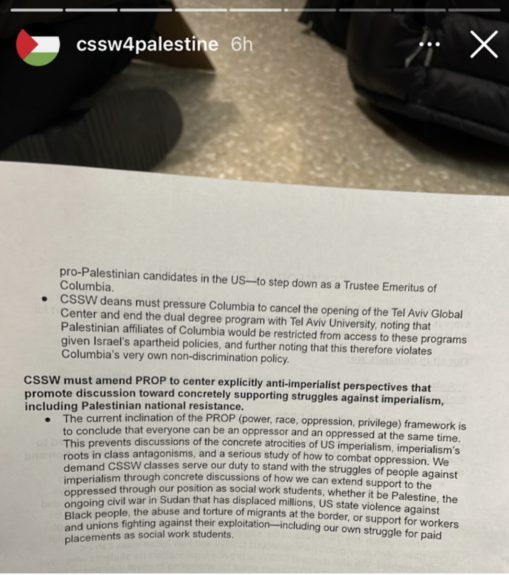
The Columbia Social Workers for Palestine issued a complete statement to the School of Social Work via Instagram, elaborating on previously stated demands. The full text of this statement can be found below.
Instagram Statement by Columbia Social Workers for Palestine Posted on Wednesday, November 8, 2023:
Statement in Support of Palestinian Resistance
We are a collective of students at the Columbia University School of Social Work. We stand in full solidarity with Palestinians resisting the ongoing occupation of their land by the settler-colonial entity Israel.
Defending Palestinian resistance aligns with the NASW code of ethics: “The primary mission of the social work profession is to enhance human well-being and help meet the basic human needs of all people, with particular attention to the needs and empowerment of people who are vulnerable, oppressed, and living in poverty.” CSSW’s mission statement also reflects this, as we aim to “interrogate racism and other systems of oppression standing in the way of social equity and justice, and to foster social work education, practice, and research that strengthen and expand the opportunities, resources, and capabilities of all persons to achieve their full potential and well-being.” Additionally, the United Nations General Assembly recognizes “the legitimacy of the struggle of peoples for independence, territorial integrity, national unity and liberation from colonial domination, apartheid and foreign occupation by all available means, including armed struggle.”
We take issue with Dean Begg’s statement addressing Palestine because it fails to uphold the missions and goals of social work listed above. The statement disregards historical context, reflects the shortcomings of our curriculum, and further perpetuates violence towards Palestinian, Arab, Muslim, Black, and Brown social work students at Columbia. Dean Begg states: “By now you have heard about the violence in Israel, which started with a surprise attack by Hamas.” This ignores that violence in Israel began with its 1948 inception as a settler-colonial state, through the process of ethnic cleansing of Palestinians and the forced removal of over half a million Palestinians in an event known as the Nakba. The Nakba followed decades of British colonial-backed Zionist violence against Palestinians. Today, over 1 million Palestinians are displaced from their homes in Gaza, double the amount of the Nakba, due to continual colonization efforts by the Israeli government-twenty days of non-stop bombing and the ongoing occupation of resources, land, and mobility.
Furthermore, reducing the attack on October 7th to a “surprise attack carried out by Hamas” opportunistically rejects the struggles of millions of people with a blanket denunciation of resistance. We must also highlight the racialized, Islamophobic connotations of terrorism and how this rhetoric is used to discredit any violence that is not state-sponsored. The word terrorism is misappropriated to classify anti-imperial efforts as immoral or barbaric, whereas states such as Israel commit heinous war crimes indiscriminately without the label of terrorism. Imperialist countries have a “legitimate” claim to violence due to the legacy of colonialism and the power they have amassed by exploiting countries in the Global South. This perpetuates post-9/11 rhetoric which has had real consequences in the recent increase of hate crimes against Middle Eastern students on campus.
The apathy in Dean Begg’s statement manifests in our classrooms, where there is immense hesitancy to discuss the issue, let alone actively promote Palestinian resistance. Classes should serve as catalysts to promote critical thinking and discussion, but CSSW professors have been instructed to not speak on the atrocities facing Palestinians following the recent unfolding events in Gaza. This hesitancy and fear demonstrate that the theories in our curriculum are subservient to US imperialist interests. These theories, through their radical facade of “decolonization” without addressing imperialism, make a pro-US, pro-colonial position more palatable to a social justice-oriented student body. The events of the past two weeks exposed many shortcomings in our PROP (power, race, oppression, privilege-informed framework) curriculum. We recognize that PROP centers anti-Black racism and that this is a crucial aspect of oppression both domestically and internationally. We want to emphasize that it is necessary to discuss and dismantle anti-Blackness. This includes fighting against it internationally and taking an anti-imperialist stance. There are direct, significant connections and contributions between the Black Power and Palestinian Liberation movements. Even the discussion of police violence, surveillance, and persecution of Black communities in the US is linked to the occupation in Palestine, as the Israeli Defense Forces train American police departments. We must recognize how American and Israeli imperialism both contribute to the global over-policing of social activists, minority populations, and revolutionary movements. The fact that a PROP curriculum is unable to facilitate a strong pro-Palestine stance among the student body in the face of historic anti-colonial resistance and clear genocide by a settler colonial nation-state, proves that our CSSW education, so far, has been ineffective. “Decolonization” and post-colonial frameworks have been exposed as nothing more than a facade of radicalism. How can it be that we are taking a course on “decolonizing social work” without advocating for Palestine?
The reality is that PROP’s discussion of decolonization only sanitizes colonialism and condemns it as a historical phenomenon. Were Native Americans to take up arms today against colonialism, would CSSW support their anti-colonial struggle? No, the decolonization efforts we learn are limited to decolonizing the mind and linguistic exercises. Even if it extends beyond this as in the PDSA reading, “Decolonization is not a Metaphor,” it remains devoid of practical solutions. Our readings serve the convenient function of hiding CSSW’s alignment with imperialist interests. A CIA report from 1985 states that the development of the ideology of postmodernism–which blurs, rather than distinguishes, oppressors and oppressed-creates a “climate of intellectual opinion [that] will almost certainly make it very difficult for anyone to mobilize significant opposition among intellectual elites to US policies in Central America, for example.” We can see how this plays out today–the postmodern climate of our program is making it difficult to discuss US policies in Israel.
Our program relies on the premise that everyone can oppress and be oppressed at the same time. This prevents discussions of the concrete atrocities of US imperialism, imperialism’s roots in class antagonisms, and a serious study of how to combat oppression. This also makes it easy to fall into a similar trap of placing blame on those around us who may be sympathetic to Zionism. We are not in favor of antagonizing our peers who have different views than us; we are antagonistic towards the oppressors and those who systematically carry out their oppression. Our courses turn the issue of Palestine into a matter of individual feelings and validation. Instead, we need our class discussions to serve the struggle against imperialism, exploitation, and oppression, not just the performative “validation” of our feelings.
On top of our need to defend resistance to oppression, ignoring how genocide and the forced displacement of over one million people impact the CSSW student body is a massive disservice to our education. We are taught cultural competency and social justice frameworks yet when it comes to Palestine, CSSW administration and professors are encouraging us to simply ignore conversations about injustice if we’re uncomfortable. Additionally, this is a mass trauma event and many students with ties to the region lack adequate support. Even students who are simply witnessing the ongoing horrors through the media are traumatized.
We will not sit idly by while a genocide is unfolding. This is not about having to continue classwork during a time of mass trauma. The issue is CSSW’s erasure of this trauma and this anti-colonial struggle in our class discussions. It is of the greatest irony that we study decolonization while turning a blind eye to historic anti-colonial efforts and US-funded ethnic cleansing. This is the true image of the CSSW curriculum–it is hypocritical, but it is also not, because it is precisely the function of these frameworks to divert anti-imperialist sentiments and struggles. We should seriously ask ourselves: who does this perspective concretely serve when the distinction between the oppressed and oppressor is blurred and combined so that everyone is both? Who benefits from saying discussions of the oppressed and the oppressor, of the capitalist class and working classes, are not complex enough when genocide is being carried out? It is clear that this perspective serves to blame the victims of genocide and humanize the oppressor. Is this not clear in the statement by Dean Begg? Nuance is important, but it is not a substitute for liberation.
Our social work training would be better served if it aligned with the concrete needs of the oppressed that we are duty-bound to assist. The motto of CSSW is to make waves, move mountains, and change lives. It is abundantly evident that the PROP lens is incapable of achieving this. We want to analyze current problems and discuss what we can realistically accomplish and change. Our classrooms should be spaces in which we can do this, where we can democratically discuss how to support Palestinian liberation against colonialism and use our resources and education to plan fundraisers, rallies, petitions, and more. In this way, the Columbia School of Social Work can be transformed into a school that fulfills our duty to stand with the struggles of people against imperialism, whether it be Palestine, the ongoing civil war in Sudan that has displaced millions, US anti-Black racism and state violence such as the police torture facility in Baton Rouge, the abuse and torture of migrants at the border, or support for workers and unions fighting against their exploitation–including our own struggle for paid placements as social work students.
Our Demands:
- Dean Begg must release a statement unequivocally supporting Palestinian resistance.
- CSSW must divest from any funding or investments connected to Israel.
- CSSW must amend PROP to center explicitly anti-imperialist perspectives that promote discussion toward concretely supporting struggles against imperialism, including Palestinian national resistance.
Columbia School of Social Work via Columbia Operations


 0 Comments
0 Comments